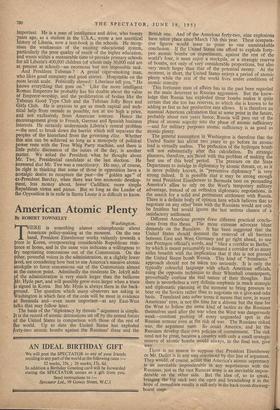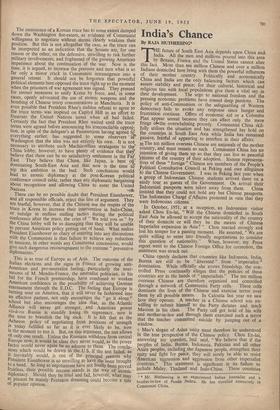American Atomic Plenty
By ROBERT TOWNELEY
Washington.
THERE is something almost schizophrenic about American policy-making at the moment. On the one hand, President Eisenhower works valiantly towards a truce in Korea, overpowering considerable Republican resis- tance at home, and in the same vein indicates a willingness to try negotiating concessions out of the Communists. On the lther, powerful voices in the administration, at a slightly lower evel, are considering how best to use America's massive atomic Stockpile to force concessions out of the Communists almost At the cannon point. Admittedly the moderate Dr. Jekyll side tif the administration is very much larger than the bellicose r. Hyde part, and will possibly grow even larger when a truce signed in Korea. But Mr. Hyde is always there in the back- ground. The question which many observers are asking in Washington is which face of the coin will be most in evidence at Bermuda and—even more important—at any East-West talks that may follow later. The basis of the "diplomacy by threats " argument is simple. A is the record of atomic detonations set off by the armed forces Of the United States in comparison with those of the rest of the world. Up to date the United States has exploded forty-two atomic bombs against the Russians' three and the British one. And of the American forty-two, nine explosions have taken place since March 17th this year. These compara- tive figures would seem to point to one unmistakable conclusion. If the United States can afford to explode forty- two atomic bombs on experiments, against the rest of the world's four, it must enjoy a stockpile, or a strategic reserve of bombs, not only of very considerable proportions, but also very much larger than that of the potential enemy. At the moment, in short, the United States enjoys a period of atomic plenty while the rest of the world lives under conditions of atomic scarcity.
This fortunate state of affairs has in the past been regarded as the main deterrent to Russian aggression. But the know- ledge that Russia has exploded three bombs makes it quite certain that she too has reserves, to which she is known to be adding as fast as her productive rate allows. It is therefore an essential American calculation that at some point in the future, probably about two years hence, Russia will pass out of the phase of atomic scarcity into the phase of atomic sufficiency —and for military purposes atomic sufficiency is as good as atomic plenty.
The general assumption in Washington is therefore that the United States has about two years to go before its atomic lead is virtually useless. The perfection of the hydrogen bomb will not substantially alter this calculation. Its strategic planners, therefore, are faced with the problem of making the best use of this brief period. The pressure on the State Department to indulge in diplomacy by atomic threats, or, as it is more politely known, in "preventive diplomacy " is very strong indeed. It is possible that it may be strong enough to send President Eisenhower to Bermuda bent on persuading America's allies to rely on the West's temporary military advantage, instead of on orthodox diplomatic negotiations, in the search for a solid and permanent settlement with Russia. There is a definite body of opinion here which believes that to negotiate on any other basis with the Russians would not only be fruitless but would ignore the last serious chance of a satisfactory settlement. Different American groups draw different practical conclu- sions from this thesis. The more extreme advocate blunt demands on the Russians. It has been suggested that the United States should demand the removal of all barriers between East and West Germany and go right ahead, to use one Pentagon official's words, and " blast a corridor to Berlin," by which is meant presumably to demand a corridor of so- many miles breadth with the implication that if this is not granted the United States bomb Russia. This kind of " bombastic " approach should not be taken too seriously. It is only the typically colourful language with which American officials, using the opposite technique to their Whitehall counterparts, proverbially confuse the real nature of their thoughts. But there is nevertheless a very definite emphasis in much strategic and diplomatic planning at the moment to bring pressure to bear on the Soviets rather than to negotiate on a give-and-take basis. Translated into sober terms it means that now, in many Americans' eyes, is not the time for a detente but the. time for the West to follow the same kind of tactics as the Russians themselves used after the war when the West was dangerously weak—constant probing of every unguarded spot in the Russian armour even at the risk of war. The Russians risked war, the argument runs. So could America, and let the Russians develop their own policies of containment. The risk need not be great, because a country with only a small strategic reserve of atomic bombs would always, in the final test, give way.
There is no reason to suppose that President Eisenhower or Mr. Dulles is in any way convinced by this line of argument. They would, of course, admit that America's atomic supremacy is an inevitable imponderable in any negotiations with the Russians, just as the vast Russian army is an inevitable impon- derable on the other side. But the idea of, so to speak, bringing the big stick into the open and brandishing it in the hope of immediate results is still only in the back-room drawing- board stage. The imminence of a Korean truce has to some extent damped down the Washington fire-eaters, as evidence of Communist willingness to negotiate without duress clearly weakens their position. But this is not altogether the case, as the truce can be interpreted as an indication that the Soviets are, for one reason or the other, on the defensive, unwilling to risk further military involvements, and frightened of the growing American impatience about the continuation of the war. Now is the time, it is argued, to increase the pressure and turn what is so far only a minor crack in Communist intransigence into a general retreat. It should not be forgotten that powerful political elements here opposed the truce right up to the moment when the prisoners of war agreement was signed. They pressed for sterner measures to unify Korea by force, and, in some cases, openly advocated the use of atomic weapons and the bombing of Chinese troop concentrations in Manchuria. It is even possible that President Rhee's sudden refusal to agree to the truce terms was inspired on Capitol Hill in an effort to frustrate the United Nations terms when all had failed. Certainly the fact that President Rhee waited until the truce terms were agreed before announcing his irreconcilable opposi.- tion, in spite of the delegate's at Panmunjom having agreed tl everything earlier, has suggested to some observers Washington that the idea was not entirely his own. It is not necessary to attribute such Machiavellian stratagems to the"' China lobby, however, to have plenty of evidence that the believe that there can be no satisfactory settlement in the Fa East. They believe that China, like Japan, is bent o dominating South-East Asia and that now is the time `to nip this ambition in the bud. Such conclusions would lead to atomic diplomacy at the post-Korean political conference council table, rather than any diplomatic bargaining about recognition and allowing China to enter the United Nations.
There can be no possible doubt that President Eisenhower, and all responsible officials, reject this line of argument. They are fearful, however, that if the Chinese use the respite of the truce in Korea to increase their intervention in Indo-China, or indulge in endless stalling tactics during the political conference after the truce, the cries of " We told you so " by the China lobby will be so damaging that they will be unable to prevent American policy getting out of hand. What makes President Eisenhower so chary of entering into any discussions with the Communists is that failure to achieve any reduction in tensions, in other words any Communist concessions, would give such dangerous encouragement to the extreme " preventive diplomatists.'
This is as true of Europe as of Asia. The outcome of the Italian elections and the signs in France of growing anti- American and pro-neutralist feeling, particularly the near- success of M. Mendes-France, the neutralist politician, in his bid for the French premiership, have combined to weaken American confidence in the possibility of achieving German rearmament through the E.D.C. The feeling that Europe is turning sour on America, that it will never be fashioned into an effective partner, not only encourages the " go it alone school but also encourages the idea that, as the Atlantic Alliance will never get stronger, and American power vis-a-vis Russia is steadily losing its supremacy, now is the time to brandish the big stick. It is felt that as the Acheson policy of negotiating from positions of strength is today fulfilled as far as it is ever likely to be, now is the moment to test it. But, on this argument, the test allows of only one result. Unless the Russians withdraw from central Europe now, it would be clear they never would, as the power factor would never again be so adverse to them. The conclu- sions which would be drawn in the U.S. if the test failed, as it inevitably would, is one of the principal reasons why President Eisenhower is so unwilling to have the issue brought to a head. So long as negotiations have not finally been proved fruitless, their possible success stands in the way of atomic diplomacy. Should they be tried and fail, however, what may at present be mainly Pentagon dreaming could become a tide of popular opinion.



















































 Previous page
Previous page